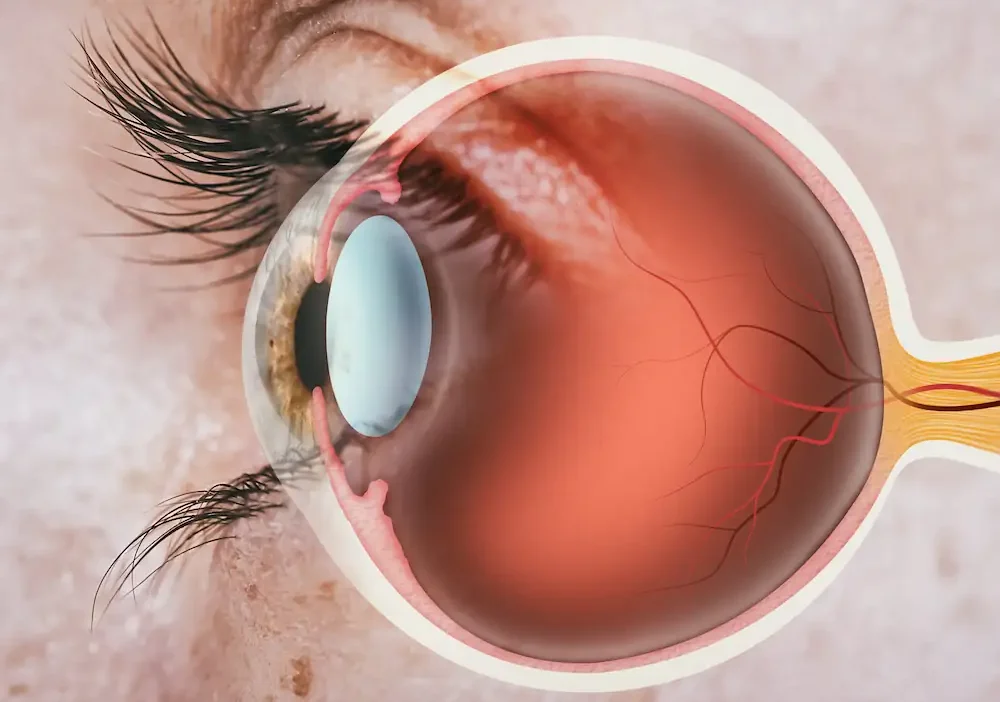Retina
Were you diagnosed with a condition that affects your retina? It’s likely that you have many questions. Read on to learn more about this important part of your eye.
What is the retina?
The retina is a layer of nerve cells located on the back inside wall of your eyeball, near the optic nerve. The retina helps to convert light into signals that your brain can interpret. The retina contains special cells known as photoreceptors. You may remember the phrase “rods and cones” from high school biology. Rods and cones are the two kinds of photoreceptors in your eyes. Rods work well in low light, and they provide black-and-white vision. They also help you to detect motion. Cones work better in medium to bright light. They help you to see colors and are responsible for your central vision.

What is the macula?
The macula is the area at the center of the retina. It has a key role in helping you see clearly. The cones are in the macula. Rods, on the other hands, are located throughout the retina.
What is the retina’s role in vision?
The rods and cones in your retina take the light signals sent by your cornea and send them to your brain. They do this by converting the light into nervous signals that the optic nerve sends to the brain. When the brain receives the signals, it converts them into the images you see.
What conditions can impact the retina?
Many conditions and diseases can affect the retina. Some of these can seriously damage your vision. Age-related macular degeneration is one of the most common problems affecting the retina. In this condition, the macula deteriorates, and you gradually lose your vision. Retinopathy occurs when there is damage to the blood vessels that bring nutrients to the retina. A common form of this is diabetic retinopathy. As the name suggests, this condition occurs in people with diabetes.
Another form of retinopathy is hypertensive retinopathy, which results from high blood pressure. Solar retinopathy can occur when someone stares at the sun and damages the macula. The retina can also become detached. It can pull away from the back of the eye, which means it can’t get the nourishment it needs to stay healthy. The retina must be reattached as soon as possible to avoid serious loss of vision. If the retina becomes detached, this is a medical emergency. Not getting immediate treatment could mean losing your vision!
How can I take care of my retina?
One of the most important things you can do to maintain a healthy retina is to have regular eye exams. During the examination, your eye optometrist will check your retina for signs of conditions like macular degeneration. The sooner a doctor finds a serious condition, the sooner you can begin treatment. Early detection is important in saving your vision. If you haven’t had a Comprehensive eye exam within the last year, make one with your Optometrist today or contact Kovach Eye Institute and set up an appointment.
Beyond regular eye exams, keep your eyes healthy by maintaining a healthy lifestyle. If you have high blood pressure, follow your doctor’s recommendations. Take blood pressure medicine as prescribed, watch your diet, and exercise as directed. If you have diabetes, it’s also important to do what your doctor instructs. Pay attention to any dietary restrictions and get regular exercise. Even if you don’t have any chronic conditions, eating well is important. Your eye needs specific vitamins and nutrients to stay healthy.
The best way to get those nutrients is to make smart food choices. Important nutrients are in citrus fruits and a variety of vegetables, including dark green leafy veggies. You should also choose whole grains and heart-healthy oils. Your eyes and body will thank you!
Why It’s Worth The Wait
Our doctors are committed to innovation and technology, in particular, where there is a direct benefit to our patients. Training and education are at the heart of our culture.
There are a few reasons you may experience longer than average wait times at your Retina appointment:
- Dilation is required for many retina tests and takes 30-45 minutes.
- Retinal Angiograms are vital in diagnosing macular degeneration and diabetic vision concerns and take about 30 minutes to administer.
- Same-day testing, diagnosis and treatment are available for your convenience.
- We see eye emergencies, in such cases, we provide priority care without an appointment, which can affect patient scheduling.
- Our doctors are on call 24/7, for virtually all area hospitals for urgent patient issues.
Get started on your path to a better healthy vision with our Retina Specialists. We have four convenient locations in Illinois: Elmhurst, Naperville, South Barrington, and Lincolnwood. Schedule an appointment online or by calling us at 630-793-4134.
The doctors at Kovach Eye Institute have either authored or reviewed and approved this content.